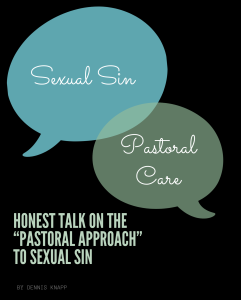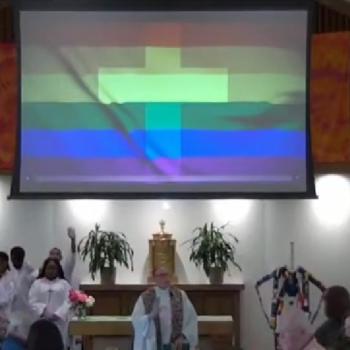But the exclusion of men and women because of their marital status or their sexual orientation/activity is pre-eminently a pastoral question, not a doctrinal one. Given our teachings on sexuality and marriage, how should we treat remarried or L.G.B.T. men and women in the life of the church, especially regarding questions of the Eucharist? [emphasis added]
Can we have an honest conversation on the “pastoral approach” when applied to sexual activity the Church considers sin? And by human sexuality, I mean all aspects of it, not just activities associated with the LGBTQ community.
Recently, Cardinal Robert McElroy, bishop of San Diego, wrote an essay for America Magazine on radical inclusion. Of note, McElroy calls for radical inclusion for LGBTQ, women, and questionable marital status. In reference to the Synod of Synodality, he states:
“Enlarge the Space of Your Tent” cites a contribution from the Catholic Church of England and Wales, which provides a guidepost for responding to this pastoral dilemma: “The dream is of a church that more fully lives a Christological paradox: boldly proclaiming its authentic teaching while at the same time offering a witness of radical inclusion and acceptance through its pastoral and discerning accompaniment.” In other words, the church is called to proclaim the fullness of its teaching while offering a witness of sustained inclusion in its pastoral practice. [emphasis added]
The paradox: how to reconcile Church teaching on human sexuality (all teaching on sexual morality, not just concerning LGBTQ people) and care of people in local parishes (pastoral practice). How does the Catholic Church practice radical inclusion AND not compromise on its teaching concerning human sexuality? How does Cardinal McElroy solve such a paradox? What does McElroy mean by “pastoral practice?”
Cardinal McElroy’s Definition of “Pastoral Practice”
Cardinal McElroy lists three elements of “pastoral practice” for radical inclusion:
- The Church as a hospital to heal the wounded
Pastoral practices that have the effect of excluding certain categories of people from full participation in the life of the church are at odds with this pivotal notion that we are all wounded and all equally in need of healing.
- The privileged place of conscience
While Catholic teaching must play a critical role in the decision making of believers, it is conscience that has the privileged place. Categorical exclusions undermine that privilege precisely because they cannot encompass the inner conversation between women and men and their God.
- Brokenness and Divine grace
…the counterpoised realities of human brokenness and divine grace that form the backdrop for any discussion of worthiness to receive the Eucharist.
And:
For this reason, the church must embrace a eucharistic theology that effectively invites all of the baptized to the table of the Lord, rather than a theology of eucharistic coherence that multiplies barriers to the grace and gift of the eucharist. Unworthiness cannot be the prism of accompaniment for disciples of the God of grace and mercy.
To summarize, pastoral practice needs to: recognize all are wounded and need healing, that conscience holds a privileged place over Church teaching, and all baptized are welcome at the Eucharist, no matter that state of their soul.
What of Sin and Holiness?
Moreover, Cardinal McElroy states that those in support of “radical inclusion” must “face head on” those who point out that all sexual activities outside marriage “constitute objectively an action that can sever a believer’s relationship with God.” McElroy states that “grave sin” (sexual sin) as the focus on the Christian moral life needs to change. Change to what, exactly? A focus on discipleship in “a relationship with God the Father, Son, and Spirit rooted in the life, death and resurrection of Jesus Christ.”
Specifically, this means:
The distinction between orientation and activity cannot be the principal focus for such a pastoral embrace because it inevitably suggests dividing the L.G.B.T. community into those who refrain from sexual activity and those who do not. Rather, the dignity of every person as a child of God struggling in this world, and the loving outreach of God, must be the heart, soul, face and substance of the church’s stance and pastoral action.
And:
We in the United States must seek a church whose doors do not close and a perimeter that continually widens if we are to have any hope of attracting the next generation to life in the church, or of being faithful to the Gospel of Jesus Christ. We must enlarge our tent. And we must do so now.
An Appeal for Honest Talk…
Again, I appeal for an honest conversation about the “pastoral practice/approach” to sexual sin. Cardinal McElroy makes a distinction between doctrinal and pastoral practice, and that the pastoral takes pre-eminence. Right off, the reader is presented with a conflict between doctrine and its application in “pastoral practice.” Furthermore, when the two come into conflict, for the sake of “radical inclusion” and “the loving outreach of God,” the doctrinal must give way to the pastoral. In other words, we proclaim “boldly” and affirm the “fulness” of the Church teaching on sexual sin, but we also keep it securely locked away in the Catechism of the Catholic Church where it cannot exclude anyone living in habitual sexual sin. I contend that this approach is neither faithful to Church teaching on sexual sin nor pastoral in the spirit of love and inclusivity.
The Abolition of Chastity
Let’s say I am a serial adulterer. Given Cardinal McElroy’s approach to “pastoral practice,” may I partake in the Eucharist? Considering the content of his essay, McElroy affirms that yes, I may come. I mean, I must not let the grave matter of the sin of adultery stand in the place of my relationship with the Trinity. Did not Cardinal McElroy state that the distinction between activity and orientation into “those who refrain from sexual activity and those who do not” cannot “be the principal focus for such a pastoral embrace…” Therefore, to demand the adulterer refrain from committing adultery denies “dignity of every person as a child of God struggling in this world.”
Moreover, according to Father Raymond J. de Souza, Cardinal McElroy “pastoral practice” means “the abolition of chastity.” All who engage in sexual activity outside that which the Church defines as morally permissible occupy the same state of grave sin. To divorce orientation from activity (as McElroy does) abolishes chastity. Therefore, all sexual sins fall by the wayside. Fr. De Souza goes on to state:
There are any number of sexual sins — pornography, masturbation and fornication being the most common — where the distinction between an orientation, a disposition, a desire, a habit and a particular act, is absolutely fundamental.
Truly Pastoral in Care of the Soul
In conclusion, allow me to quote from the United States Conference of Catholic Bishops (USCCB) document, Ministry to Persons with a Homosexual Inclination: Guidelines for Pastoral Care:
All people, whether married or single, are called to chaste living. Chaste living overcomes disordered human desires such as lust and results in the expression of one’s sexual desires in harmony with God’s will. “Chastity means the successful integration of sexuality within the person and thus the inner unity of man in his bodily and spiritual being.”
According to the USCCB, the call to chastity resides at the center of the Church teaching on sexual activity, regardless of kind and type. Therefore, the truly “pastoral practice” when dealing with the adulterer must include a call to repentance and living a chaste life. To include and welcome the adulterer to partake freely in the Eucharist, or “enlarge” the tent, puts their soul at risk and causes scandal concerning the body and blood of the Lord (1 Corinthians 11:27).
In truth, Cardinal McElroy’s “pastoral practice” places souls at risk in his call for “radical inclusion” by encouraging this carve out for grave sin.
If you enjoy my writing and want to support my work, please consider donating a monetary gift of any size or quantity by clicking here. Thank you!
Read my other writing here.
Please click the link below to join.
Voices of the Faithful in the Synod on Synodality
Please make your voice heard.
I Support Church Teaching in the Synod of Synodality













